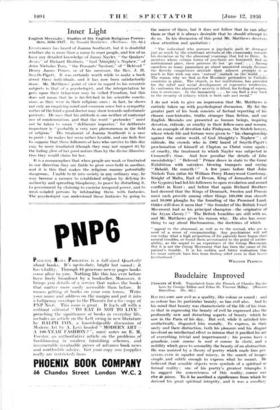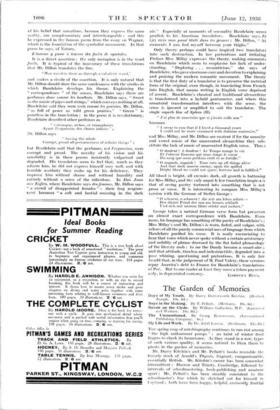Baudelaire Improved
Flowers of Evil. Translated from the French of Charles Baud,,. lair,, by George Dillon and Edna St. Vincent Millay. (Ramis!' Hamilton. 10s. 6d.) BAUDELAIRE saw evil as a quality, like colour or sound ; and as colour has its particular beauty, so has evil also. And to his mind that beauty was characteristic of the life of his time, so that in expressing the beauty of evil he expressed also the profoundly new and disturbing aspects of beauty which he saw in the Paris of his day. But evil, while it satisfied him aesthetically, disgusted him morally. To express, in their unity and their distinction, both his pleasure and his disgust involved an intellectual effort so intense that it purified his art of everything trivial and impermanent ; his poems have a grandeur, vaste comme la nail et emote la clarte, and a nobility which gave to sensuality the beauty of an abstraction. He was assisted by a theory of poetry which made him per- severe, even in squalor and misery, in the search of images simple_ and subtle enough to express what he meant. He believed that sensible objects were symbols of a spiritual or formal reality ; one of his poetry's greatest triumphs is to suggest the concreteness of this reality, commie ace rfir de pierre. To it he ascribed a significance from which he derived his great spiritual integrity, and it was a corollary
of his belief that sensations, because they express the same reality, are complementary and interchangeable ; and this he expressed in the famous poem from the essay on Wagner, which is the foundation of the symbolist movement: - In that poem he says, of Nature,
L'homme y passe a tracers des Preis de symboles.
It is a direct assertion ; the only metaphor is in the word forets. It is typical of the inaccuracy of these translations that Mr. Dillon translates the line,
"Man wanders there as through a cabalistic wood,"
and maims a simile of the assertion. It is only natural that Mr. Dillon should show the same carelessness with the similes in which Baudelaire develops his theme. Explaining the- " correspondence " of the senses, Baudelairc says there arc perfumes dour comme les hautbois. Mr. Dillon says, " Sweet as the music of pipes and strings," which conveys nothing at all. Baudelaire said they were reds comme les prairies, Mr. Dillon, " as full of peace as wild green prairies." " Green " is pointless in the translation ; in the poem it is revolutionary. Baudelaire described other perfumes as
" carrompus, riches, et triomphants Ayant l'expansion des choses infinies ";
Mr. Dillon says
" having the whole Corrupt., proud all-pervasiveness of infinite things " ;
but Baudelaire said that the perfumes, not teapansion, were corrupt and proud. The novelty of his vision and his sensibility is in these poems insistently vulgarised and degraded. His translators seem to feel that, much as they admire him, he did not express himself very well, and with horrible assiduity they make up for his deficiency. They improve him without shame and without humility and entirely without a sense of the ridiculous. In Don Juan our Enfers, where Baudelaire says des femmes, Mr. Dillon says a crowd of disappointed females " : their long mugisse- meat becomes " a soft and bestial moaning in the dark air." Especially at moments of sensuality Baudelaire seems prudish to his American translators. Baudelaire says, Et (je) reris mon passe blotti dans tes genoux : Mr. Dillon, " At
moments . I can feel myself between your thighs."
Only theory perhaps could have inspired two translators into such destruction. In her pretentious and irritating Preface Miss Millay expresses the theory, making comments on Baudelaire which seem to emphasise her lack of under- standing. " Deploring . . . ronidnficism," she says of Baudelaire, who gave enormous care and devotion to explaining and praising the modern romantic movement. The theory is that the first duty of a translator is to preserve the metrical form of the original, even though, in translating from French into English, that means writing in English verse deprived
of accent. Baudelaire's classical and traditional alexandrine is transformed into a hybrid pentameter, and where this unnatural transformation interferes with the sense, the sense is ignored or amplified to suit the translator. The single superb line of Spleen (II) " J'ai plus de souvenirs que si j'avais mile am " becomes " I swear to you that if I lived a thousand years I could not be more crammed with dubious souvenirs," and Miss Millay, and Mr. Dillon are content if for the sonority and vowel music of the unaccented alexandrine they sub- stitute the lack of music of unaccented English verse. Thus : " 0 douleur ! b douleur ! Le Temps mange la vie Et l'obscur Ennemi qui nous ronge le coeur Du sang que nous perdons emit et se fortifie."
" 0 anguish, anguish ! Time eats up all things alive And that dark unseen enemy, upon the spilled
Bright blood we could not spare, battens and is fulfilled."
All blood is bright, all enemies dark, all growth is battening for Miss Millay, and the only angui:h her translation inspirt s is
that of seeing poetry tortured into something that is not prose or verse. It is interesting to compare Miss Millay's version with the German of Stefaft George : " 0 sehxnerz, o sehmerz ! die zeit am leben zehret- Der diistre Feind der uns am herzen schlfirft Und sich mit unsrem blute sttirkt and rnehret."
George takes a natural German verse form but preserves an almost exact correspondence with Baudelaire. Even more, his language has something of the purity of Baudelaire's ; Miss Millay's and Mr. Dillon's is worn, faded, and vulgar, with echoes of all the purely commercial uses of language from which Baudelaire purified his verse. It is really excruciating to hear that voice which never spoke without a certain aristocracy and nobility of phrase drowned by the flat faded phraseology of the literary mob ; to see the Dandy become a smart-alec ; and that attitude, timeless and indestructible, degraded into a pose whining, questioning and pretentious. It is only fair to add that, in the judgement of M. Paul Valery, these versions repay America's debt to France for Baudelaire's translations of Poe. But to one reader at least they seen► a token payment
only, in depreciated currency. GORONWY REES.























































 Previous page
Previous page